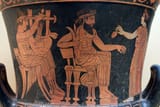Search Results
6/11/2025, 3:26:41 PM
There's a very common misconception that in ancient times, people literally believed in the most ridiculous parts of polytheistic religions. But this is incorrect, most people did not believe that a chariot pulls the sun across the sky, not in a literal sense at least. The way ancient pagans saw the world was actually not that different from how modern Christians do today (outside of a few uneducated rural people maybe, nobody, no matter how devout, genuinely believes God is a literal flesh and bone old bearded man who lives in the clouds, rather seeing that as symbolic).
Outside of a few uneducated rural people maybe, nobody, no matter how devout, genuinely believed creatures like Centaurs or Sirens were real. Educated Greeks and Romans often interpreted myths allegorically or symbolically. Think of Plato, who criticized literal myth but acknowledged their metaphorical value; or Stoics, who reinterpreted gods as forces of nature or aspects of the soul. By the time of the Roman Empire, especially from the 1st century BCE onward, educated pagans interpreted myths allegorically and often integrated philosophical systems like Platonism, Stoicism, or Neoplatonism into religious thought. A pagan priest or philosopher in 300 CE did not believe in Zeus the same way a peasant in 800 BCE might have. Just like no serious modern Christian believes heaven is literally "above the sky" in a three-tiered universe anymore.
Thousands of years of Jewish, Christian, and later Islamic writers satirizing pagans as stupid has created the modern misconception that Greco-Roman polytheists living in the late Roman period held the same religious beliefs that their predecessors from the time of Homer did, which couldn't be further from the truth. This would be like thinking modern-day Christians believe the sun revolves around the earth because their ancient counterparts did.
Outside of a few uneducated rural people maybe, nobody, no matter how devout, genuinely believed creatures like Centaurs or Sirens were real. Educated Greeks and Romans often interpreted myths allegorically or symbolically. Think of Plato, who criticized literal myth but acknowledged their metaphorical value; or Stoics, who reinterpreted gods as forces of nature or aspects of the soul. By the time of the Roman Empire, especially from the 1st century BCE onward, educated pagans interpreted myths allegorically and often integrated philosophical systems like Platonism, Stoicism, or Neoplatonism into religious thought. A pagan priest or philosopher in 300 CE did not believe in Zeus the same way a peasant in 800 BCE might have. Just like no serious modern Christian believes heaven is literally "above the sky" in a three-tiered universe anymore.
Thousands of years of Jewish, Christian, and later Islamic writers satirizing pagans as stupid has created the modern misconception that Greco-Roman polytheists living in the late Roman period held the same religious beliefs that their predecessors from the time of Homer did, which couldn't be further from the truth. This would be like thinking modern-day Christians believe the sun revolves around the earth because their ancient counterparts did.
Page 1
